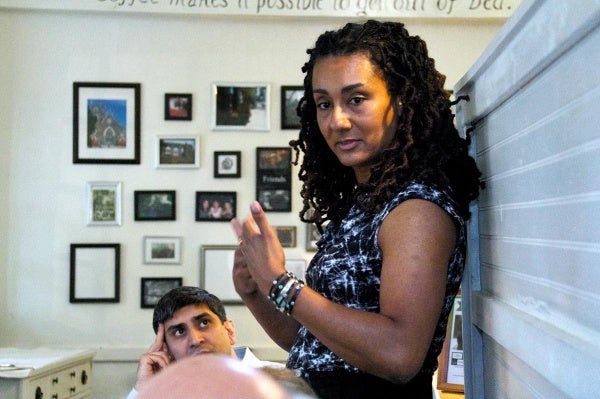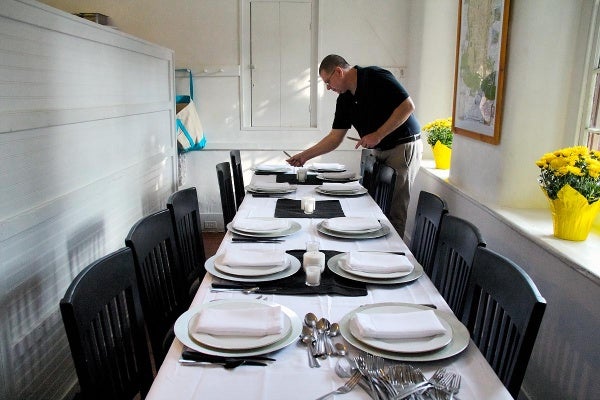Lisa Nutter: It is time to make all schools accountable
When it comes to addressing the educational system challenges that the city faces, Philadelphia’s First Lady, Lisa Nutter feels the best place to start is by asking the key question, “How do you do big system change work?” Nutter, who is President of Philadelphia Academies, Inc. discussed her work and more during an intimate dinner conversation Wednesday evening inside Little Jimmie’s Bakery Cafe in Mt. Airy. Nutter was the latest guest lecturer for Mt. Airy USA’s Metropolitan Minds Speaker Series.
Nutter told attendees that a new conversation is emerging in Philadelphia, one which is striving to look at all schools – charter, traditional public, parochial and private – and the seats that are in them, as potential assets. The focus is how to make every seat one that offers a high quality education.
The SRC’s Plan
Nutter admits the public school system has to work with with an ever-changing multitude of variables each day. “It’s complicated,” she stressed. Nutter said there is not one solution to any problem. It is essential to figure out what is working and what is not.
Nutter stated that one of the things she values about the School Reform Commission’s plan is that it is an unfinished framework with opportunity for input and constructive discourse. “What I appreciate about the conversations we’re moving into now as a city, even though we’re going to fight a lot about the SRC’s plan, is that finally there’s a discussion on the table that is looking at schools in the city as a system of schools,” she stated.
Nutter expressed concern that people are getting caught up in a debate of charter school vs. public school and can no longer talk with one another.
She said she believes it is time to make all schools accountable, because right now they are not.
Nutter explained that at the core of the SRC’s plan is an approach to decentralize. “I agree with that,” she asserted. “Some parts of the public school system need to be dismantled.” Nutter said she likes the SRC’s strategy to implement so-called achievement networks, groups of 25 schools that would be competitively managed according to performance-based contracts, utilizing value-added assessment. “It makes sense to me,” Nutter said, adding that coming into the network with an established skill set will be a critical factor.
When people ask the question “Where this has worked?”, Nutter said the answer is difficult to come by because “nobody’s done this.” She mentioned that other cities, such as New York and Denver, are only just starting to move in a similar direction. The precedent is just not there. Philadelphia is “not often thought of being in front of things, but we actually are,” Nutter elaborated.
Philadelphia Academies, Inc.
Since 2005, Nutter has been president of Philadelphia Academies Inc., a non-profit youth development corporation whose mission is to prepare students for post-secondary education and employment through its “schools within a school” – small learning communities called Career Academies. The Career Academy model creates teams of students, educators and outside volunteers from the business community who focus on project-based learning within a specific career area. Real-life work experiences are integrated with educational curriculum and personal interests. The primary goal for the organization is to significantly impact the economic, social and family outcomes for its graduates by building a network between students and positive adults that will reach beyond the youths’ academic years.
PAI boasts one of the most studied educational models and was the subject of a seminal 15 year long-term impact study published in June 2008, which documents the organization’s proven track record. Nutter said PAI is now using that data to talk to the Philadelphia School District about how to expand the work it does. PAI wants to enlarge its current enrollment of 3000 students to 9000 in the next few years, and hopes to achieve a goal of 12,000 students in its Career Academies by 2015.
A question that arises from having a model that works is, why isn’t it being seen more? “Implementation challenges are really human capital challenges,” Nutter declared. She noted that PAI spends much of its time preparing adult educators and volunteers. Nutter also heads up the Digital On-Ramps initiative which uses technology to improve digital literacy and 21st century skills development in both youths and adults.
Nutter’s parents were both teachers and she said she got into the issue of education and its impact on local and regional economies during graduate studies in City Planning at the University of Pennsylvania. She worked as senior project director at OMG Center for Collaborative Learning for 12 years before joining PAI. She currently serves on the board of Big Picture Philadelphia, a non-profit which leads public school reform in a model not unlike PAI’s. “Everything I’ve done has come together in this role,” she remarked.
WHYY is your source for fact-based, in-depth journalism and information. As a nonprofit organization, we rely on financial support from readers like you. Please give today.













